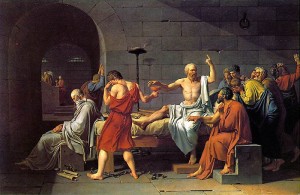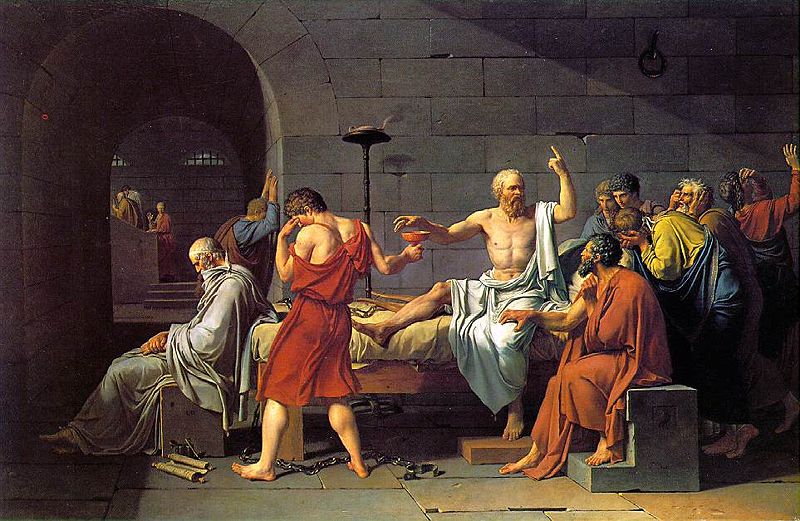Day Two
 Topics: Introduction to the Socratic Method, which is a dialectic questioning. What is a philosophic question? Why is it important to question? What is a universal definition and why does Socrates seek one for so many things? How can we apply this method to our every day lives? Socrates insisted that we use lots of terms that we think we understand, but after being questioned, most would find they didn’t really have as firm of an understanding as they believed. Socrates is known for saying “the unexamined life is not worth living.” We will be exploring the ways in which we can examine life. Importantly, Socrates believed it was better to die than to change the way he lived his life. How should we understand this view and the life he lived?
Topics: Introduction to the Socratic Method, which is a dialectic questioning. What is a philosophic question? Why is it important to question? What is a universal definition and why does Socrates seek one for so many things? How can we apply this method to our every day lives? Socrates insisted that we use lots of terms that we think we understand, but after being questioned, most would find they didn’t really have as firm of an understanding as they believed. Socrates is known for saying “the unexamined life is not worth living.” We will be exploring the ways in which we can examine life. Importantly, Socrates believed it was better to die than to change the way he lived his life. How should we understand this view and the life he lived?
Activities: (1) Read excerpts from Socrates Café and Phaedo. (2) Group activity: derive a universal definition of a chair, which is much more difficult than it seems at first blush. We will then discuss this as a class. (3) Read The Apology and prepare for in-class mock trial as if Socrates were to be tried in our modern system.
Materials: Socrates Café book excerpt, along with copies of important sections on death from the works of Plato (Apology, Crito, and Phaedo)
Quotes:
From Socrates Cafe:
A Socratic dialogue reveals how different our outlooks can be on concepts we use every day. It reveals how different our philosophies are, and often how tenable – or untenable, as the cause may be – a range of philosophies can be. Moreover, even the most universally recognized and used concept, when subjected to Socratic scrutiny, might reveal not only that there is not universal agreement, after all, on the meaning of any given concept, but that every single person has a somewhat different take on each and every concept under the sun.
Socrates’ method of examination can indeed be a vital part of existence, but I would not go so far as to say that it should be. And I do not think that Socrates felt that habitual use of this method “makes people happier.” The fulfillment that comes from Socratizing comes only at a price – it could well make us unhappier, more uncertain, more troubled, as well as more fulfilled. It can leave us with a sense that we don’t know the answers after all, that we are much further from knowing the answers than we’d ever realized before engaging in Socratic discourse. And this is fulfilling – and exhilarating and humbling and perplexing.
At certain junctures of a Socratic dialogue, the “forcing” that this confrontation entails – the insistence that each person carefully articulate her singular philosophic perspective – can be upsetting. But that is all to the good. If it never touches any nerves, if it doesn’t upset, if it doesn’t mentally and spiritually challenge and perplex, in a wonderful and exhilarating way, it is not Socratic dialogue. The “forcing” opens us up to the varieties of experiences of others – whether through direct dialogue, or through other means, like drama or books, or through a work of art or a dance. It compels us to explore alternative perspectives, asking what might be said for or against each.
Apology:
You are wrong, sir, if you think a man who is any good at all should take into account the risk of life or death; he should look to this only in his actions, whether what he does is right or wrong, whether he acting like a good or a bad man.
Wherever a man has taken a position that he believes to be best, or has been placed by his commander, there he must I think remain and face danger, without a thought for death or anything else, rather than disgrace.
To fear death, gentlemen, is no other than to think oneself wise when one is not, to think one knows what one does not know. No one knows whether death may no be the greatest of all blessings for a man, yet men fear it as if they knew that it is the greatest of all evils. And surely it is the most blameworthy ignorance to believe that one knows what one does not know.
I would much rather die after this kind of defense than live after making the other kind. Neither I nor any other man should, on trial or in war, contrive to avoid death at any cost.
It is not difficult to avoid death, gentlemen; it is much more difficult to avoid wickedness, for it runs faster than death.
Either the dead are nothing and have no perception of anything, or it is, as we are told, a change and a relocating for the soul from here to another place. If it is complete lack of perception, like a dreamless sleep, then death would be a great advantage.
Phaedo:
Ordinary people seem not to realize that those really apply themselves in the right way to philosophy are directly and of their own accord preparing themselves for death and dying.
Reflections:
This is probably the most important day of the class for the students to really “get” what doing philosophy is. I’ve done the activity about defining a chair for the past two years, and it’s always one of the activities that really stands out. We have a lot of fun and get riled up and it’s very enjoyable. However, I also have them read the entirety of The Apology in class, and this is the most reading we ever do and the least favorite thing we do, but it has an awesome pay-off with the mock trial.

I truly appreciate this post. I have been looking all over for this! Thank goodness I found it on Bing. You’ve made my day! Thx again!